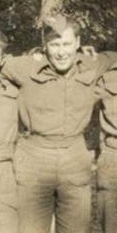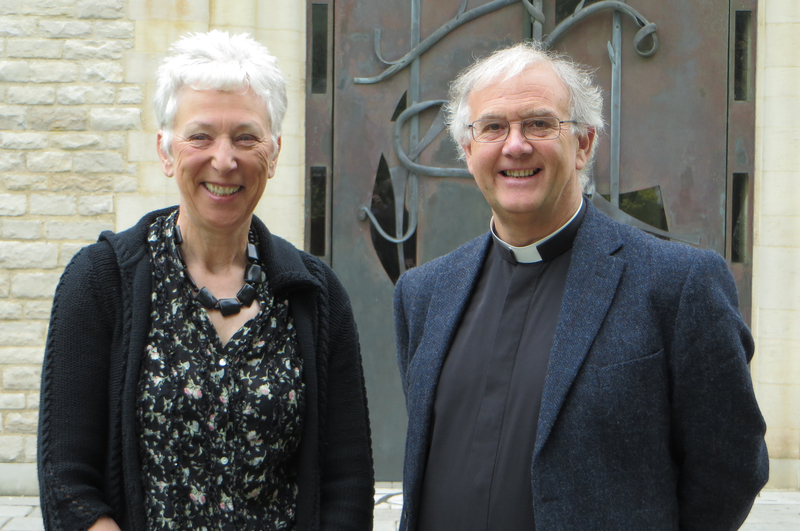Poignant reminder of D-Day sacrifice
THE daughter of a fallen Canadian soldier will read her father's final letter to his family as part of Portsmouth Cathedral's D-Day 70 commemoration.

Arland Scott during the Second World War

Joan Scott Allen with the dean of the cathedral, the Very Rev David Brindley

“Give my daughter a kiss from her loving daddy and all my love and kisses to you darling. God bless you both for me. Always your devoted and loyal loving husband … ”
A woman will pay a moving tribute to her Canadian father who was killed in the Normandy landings of 1944, as part of the D-Day 70th anniversary service which will take place at Portsmouth Anglican Cathedral in Old Portsmouth at 8.05am on Sunday 8 June. The service will be broadcast live nationally on BBC Radio 4.
Joan Scott Allen will read the final words her 27 year-old father penned to his family just days before embarking on the D-Day mission from which he never returned.
Arland Scott was in the Canadian Royal Artillery. His family had emigrated to Canada from Ireland and he came to England as a soldier and was stationed in Sussex. In Spring 1941, he took the opportunity to visit his grandparents in Ireland while on leave where he met his wife-to-be Ellen Faulkner, who was singing in the church choir. They were married in August 1942.
One year later, Arland was moved to a base at Park Gate in Fareham, Hampshire, as part of a special operations mission to prepare for D-Day. Ellen was by this time pregnant with Joan and, in November 1943, Arland managed to return home for 11 days leave for the birth of his daughter.
Joan only discovered her father’s letters home, while sorting through personal effects when her mother was admitted to a nursing home suffering with dementia last year. She came across her mother’s vast collection of letters in lever arch files and they tell a remarkable personal story of how the lives of ordinary people were shaped by the forces of history.
The letters reveal how Arland actually stayed a week longer on leave than he should have done after the birth of his daughter – so was technically AWOL. He got into plenty of trouble but felt it was worth it. Arland defended himself when he went up in front of the Colonel and the charges were dismissed.
A driver for self-propelled guns, Arland sustained a gunshot wound to the head on Juno beach on 8 June 1944. He was evacuated to Gosport but died the same day. Ellen received a series of telegrams saying that Arland was missing presumed dead but then found and injured. It was not until the final telegram on 21 June 1944 that she knew he had died.
Arland was buried in Gosport near Portsmouth and a local woman adopted the graves of four soldiers – one of them Arland’s. She wrote to the Ontario Star in Canada in a bid to trace his family. Remarkably, Arland’s parents saw the letter in the newspaper and told Ellen. There is also a series of letters in the files between Ellen and the lady in Gosport regarding the graves and Ellen sent money for flowers. Four years later, Arland’s body was exhumed and reinterred with other allied servicemen in Brookwood Military Cemetery in Surrey.
In the final letter from Arland that Joan will read, he expresses such great tenderness and love for his young wife and their baby. His words are incredibly moving and all the more so for being read seventy years later by his daughter here in Portsmouth.
The distinctive tower and cupola of Portsmouth Cathedral would have been visible to the many tens of thousands of service men and women who gathered in and around Portsmouth in the months leading up to June 1944. At Southwick House just outside the city, plans were laid for the massive invasion, the aim of which was to free Europe from the tyranny of Nazism. From the Cathedral Tower an observer would have seen ships and landing craft filling The Solent as allied troops from around the world – including Arland and his troop - prepared to cross the channel and land on the beaches of Normandy.
Also reading at the service will be Portsmouth Cathedral Chorister Ben Nash, aged 10. His father Phillip Nash is RN Captain of HMS Defender. Ben will read an extract from the Four Freedoms speech given by Franklin D Roosevelt.
The service will be led by the Dean of Portsmouth and the Lord Bishop of Portsmouth. Music for the service will be directed by Dr David Price, Organist and Master of Choristers and will feature Portsmouth Cathedral Choir and Cantate, the Cathedral’s youth choir. They will be joined by the Chamber Choir of The Portsmouth Grammar School and the school’s Director of Music Sam Gladstone. The service will include music from Barry Rose, the Pie Jesu from Andrew Lloyd Webber’s Requiem and Hymn to the Fallen (from Saving Private Ryan) by John Williams. If you would like to be in the congregation, please arrive and be seated by 7.35am.
This is one of number of services and events in the City of Portsmouth to mark the 70th anniversary of D-Day:
Sunday 1 June – Songs of Praise at 5.10pm on BBC One featured musicians from Portsmouth Cathedral.
Wednesday 4 June – BBC Radio 3 Choral Evensong will be broadcast live from Portsmouth Cathedral. If you would like to be in the congregation please arrive between 2.45-3.00pm.
Thursday 5 June – Portsmouth Cathedral Clergy and Choirs will take part in a Drumhead Service on Southsea Common at 10.45am.
Sunday 8 June at 10.30am – D-Day and Normandy Fellowship Service, which is held annually at Portsmouth Cathedral.